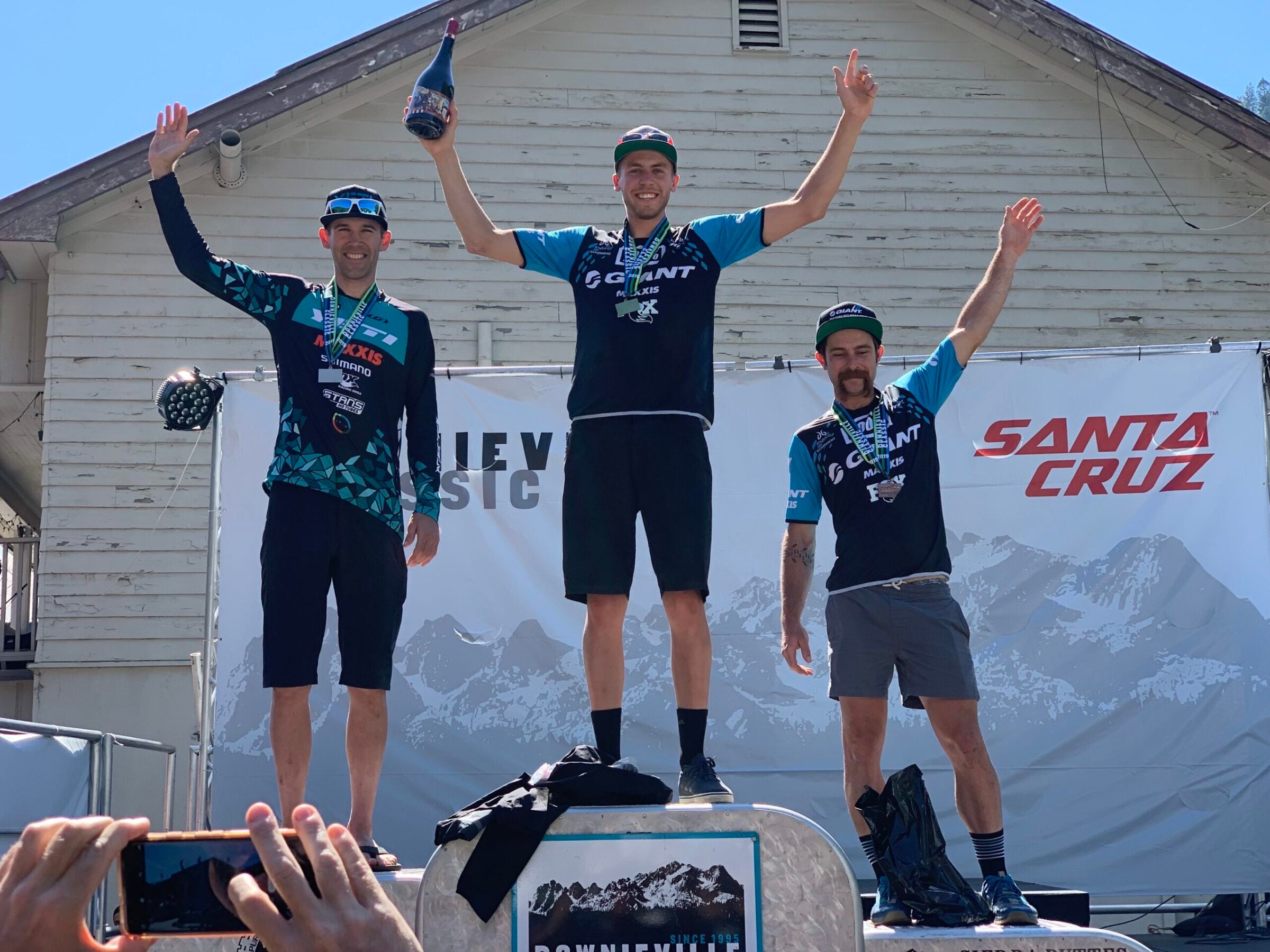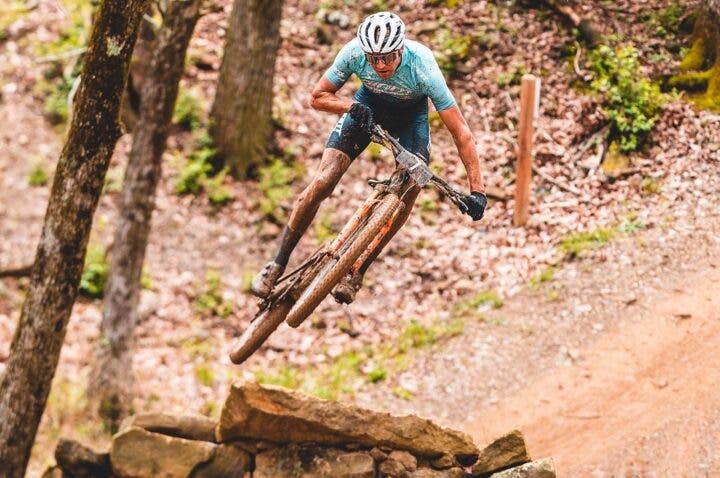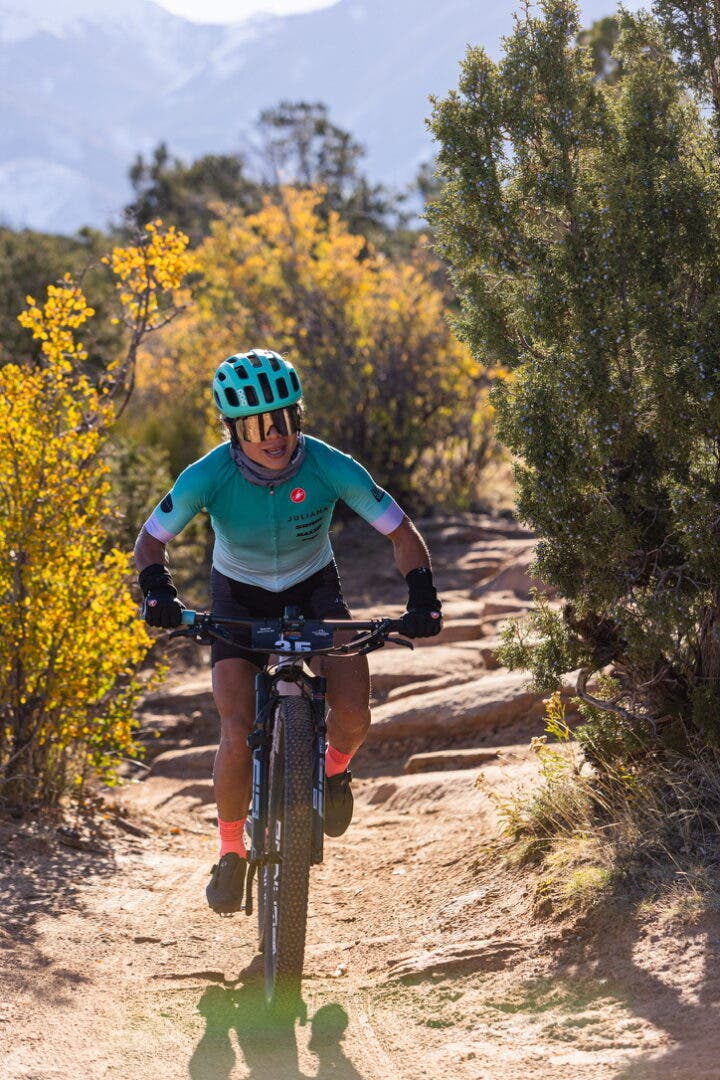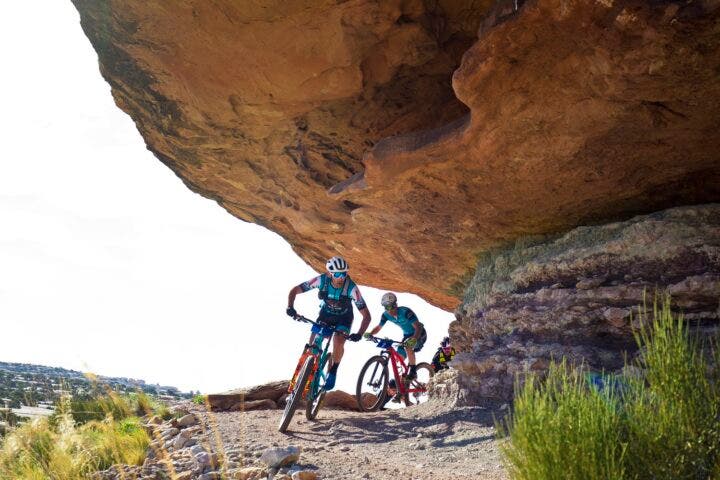Introducing the Singletrack Series: 'Our own modern version of XC racing'

If not exactly a storyline, ‘the spirit of gravel is mountain biking’ became a popular meme during this year’s inaugural Life Time Grand Prix series.
The actual story was that mountain bikers ended up doing very well in the off-road series — not just at the mountain bike races. The overall top three men and women came from pro XC backgrounds.
Sidenote: mountain biker (and Grand Prix participant) Ryan Standish’s small, for-purchase run of ‘the spirit of gravel is mountain biking’ t-shirts and stickers also did very well.
Nevertheless, not all of the mountain bikers who competed in the Grand Prix found it that inspiring. In August, Lea Davison told me why she chose to drop out.
Stephan Davoust was another longtime MTB pro who started the series and didn’t complete it. His situation was due to both illness — he missed Sea Otter — and conflicts with other, priority races later in the season.

After reading Davison’s story, however, Davoust realized that he didn’t need to feel bad about another detail — he didn’t really enjoy the racing.
“She was like, ‘this isn’t what mountain bikers want to be doing,'” Davoust said. “So when I read that it was like, ‘I’m not the only one that feels like they’re being forced to do something just because that’s where the cycling world is going.'”
After the Leadville 100, Davoust dropped out of the Grand Prix to focus on two races that were important to him, the BC Bike Race and USA Cycling marathon mountain bike nationals (he finished second).
He also started thinking.
“It was like, instead of just complaining and riding along with this gravel thing I’m gonna get together some of these other mountain bikers that are being forced into gravel, and we’re gonna create something cool.”
Meet the Singletrack Series
Davoust linked up with other MTB pros Evelyn Dong, Geoff Kabush, as well as Standish, and the four riders have come up with a concept dubbed the ‘Singletrack Series.’
The plan is to link four independent mountain bike races together under the Singletrack Series umbrella. There will be prize money at each race, as well as an overall pot at the end.
The idea, said Evelyn Dong, who was also part of this year’s Grand Prix, is “to fill a void in the race scene.”
“The World Cup XC scene seems to be doing well, and there’s a lot of kids riding through the ranks and pursuing that,” she said. “On the other end of the spectrum, there’s the Life Time and gravel scene which is also booming. But, as far as a domestic XC race circuit, there’s virtually nothing cohesive. So that’s where we can not only fill in but create something more fun, more exciting, and basically our own modern version of XC racing.”

Up until 2019, race promoter Epic Rides put on a perennially popular race series that included now-defunct races like the Carson City Off-Road and Oz Trails Off-Road. The Epic Rides Series was a hit among pros and amateurs alike, with large cash purses and a festival-like atmosphere. Every weekend opened with a spicy fat tire crit and ended with a true backcountry race.
Davoust said the Singletrack Series is an attempt to recreate some of the Epic Rides vibe, namely the large purse that drew a healthy pro contingent.
“These will be races with a high payout, that give media a good idea of where the top athletes will go for mountain biking,” he said. “And for the athletes, it can help them with a schedule. It’s to put people on the same page in the mountain bike world, to put some cohesion back into mountain biking.”
Rather than start new events from scratch or try to use a single organizer, the Singletrack Series will unite four existing events in the North American West.
The series will kick off in Utah in March with the three-day Moab Rocks stage race, then move to Colorado for GJ Rides and Vibes in May. The Back Forty in Whistler, BC will be the third race in June, and in July the series will conclude with the 25th annual Downieville Classic in California.
Each of these races is a standalone in its own right, with some having formed the backbone of a domestic race scene that’s ebbed and flowed over the years.
The series opener, Moab Rocks, is put on by longtime promoter TransRockies Race Series and gives riders an early-season opportunity to race some of Moab’s famous red rock tech. Kabush and Davoust went 1-2 at the event in Utah last year, with Kabush winning the previous three editions of the stage race.

The Downieville Classic is perhaps the most iconic MTB event of all, crowning the unofficial all-mountain world champions after the two-day XC and DH races. Davoust is the reigning all-mountain world champ.
So far, Davoust said, he’s gotten full buy-in for the series from all of the race organizers.
“They’re really excited to bring their events into the limelight — in the past, many of them have sold out,” he said. “But to get more media coverage and get a higher caliber of athlete is what really excites these promoters.”
When looking for events to include in the series, Davoust said he was looking for races that required “downcounty, technical skills,” as well as a fun, festive atmosphere. However, some of the events that made the final cut have a huge additional perk: they partner with and give back to trail stewardship organizations.
For example, Downieville has long benefitted the Sierra Buttes Trail Stewardship, an organization that has built over 110 miles of new trail in the last two decades.
And, proceeds from the Back Forty, a one-day race consisting of three unique stages, go towards new trail construction in Whistler and mountain bike programming for the Indigenous Life Sport Academy.
Open to all
In order to make the Singletrack Series attractive to potential participants, Davoust said that he and his team are working with existing and potential sponsors to help boost both the individual prize purses of the events, as well as create an overall award for the series.
Some of the individual events already offer prize money, ranging from a few thousand dollars to $30,000, which is what’s up for grabs to the top ten men and women at GJ Rides and Vibes.
Dong said that money will help attract a bigger pro field to events that are already popular.
“There’s already huge amateur interest in this style of racing, aka downcountry, but on the pro side there’s not enough incentive to draw a huge field,” she said. “So that’s what we’re doing, bringing pros to these fun races. I think it benefits everyone to have more pros at races such as these — higher caliber racing brings visibility and thus longevity to these races.”
In addition to healthy prize money, the Singletrack Series team also hopes another angle will bring more riders to the events: the series is open to anyone.
“It’s not application based at all,” Davoust said. “Whoever shows up to these events is entered into the overall series.”
No one is trying to advertise the Singletrack Series as an ‘either or’ with the Life Time Grand Prix, or to cast shade on the gravel-centric series. If anything, the inaugural series provided the motivation for other promoters and athletes to create their own series-style events.
“We don’t want to take away from anything gravel, this is just creating the mountain bike side,” Davoust said. “A lot of people absolutely love gravel — the riding, the racing, the atmosphere — but we absolutely love the mountain bike side of it and that’s where we thrive. This is creating a series that challenges people technically, and they still have to be fit.”
And while Davoust won’t be entering the Grand Prix again in 2023, some of his mountain biking compatriots definitely are (ahem Keegan and Russell).
However, those who enjoy the spirit of both gravel and mountain biking also won’t have to pick one or the other — none of the races overlap.